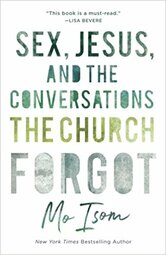I’m currently writing a part of a book called Four Views on Talking to Teenagers about Sex for The Youth Cartel (It'll be available in January, 2019). As part of my preparation for this, I’ve been reading all I can about sex… from as many different and varied authors as possible. Although I was completely unfamiliar with Mo Isom before reading Sex, Jesus, and the Conversations the Church Forgot, I was intrigued enough by both the topic and the title to pick this book up.

Few people will disagree with Mo’s basic premises:
• “Sexual understanding, above all things, is not simply about behavior modification, it’s about heart transformation” and
• “Sex is God’s invention.”
With these two premises serving as Mo’s foundation, she then explores several conversations the church forgot to have about sex, including
• “A conversation about the bigger picture of purity compelling [your] choices”;
• A conversation about sex guilt, “the complete mental shift required of you shortly after your vows are swapped and you sneak up to the bridal suite with your new spouse”;
• And a conversation that doesn’t just tell singles to avoid sex but instead acknowledges that “sex is worship, and wonderful, even through the growing pains and the trial-and-error learning curve that comes early on in marriage.”
Those who are conservative will wholeheartedly love Mo’s book. However, those who are progressive will find parts of Mo’s book difficult to stomach. I had to actually abandon the chapter on pornography called “You Are What You See” because I simply couldn’t take any more of what she was saying.
Likewise, I struggled with Mo’s chapter on modesty entitled “Wandering for Worth.” She claims, “You and I both know full well that there are deeper reasons we wear certain things. I liked feeling like I could captivate a man’s mind. I enjoyed feeling desirable.” While this might resonate with some women, it didn’t with me. Trying to captivate a man’s mind is simply not how I choose my clothing.
More problematic for me, however, was Mo’s assertion that “Not only do we need to take responsibility for what our pining for approval is doing to the minds and hearts of others but we need to remember that we can’t fully control our audience either. When we compromise our modesty to exercise our freedom and wear what we want, we put ourselves on display for anyone and everyone – young men, old men, fathers, husbands – and we thoughtlessly encourage their lustful gazes.”
As a youth pastor, I take issue with our obsession over modesty (for basically anything other than respect for another culture). Beyond that, however, I am disturbed that in the #MeToo world in which we live, Christian leaders are still teaching people that women are responsible for men’s lust and inappropriate sexual behavior; that our clothing choices are to blame for someone else’s behavior. Such a mindset fails to respect men and women alike. It also fails to teach people to take ownership of their behavior and choices, something that without which, I would argue it’s impossible to love either yourself or others.
Progressives will also take issue with Mo’s assertion that the only ways out of sexual sin are to marry the person you’re engaged in sexually immoral behavior with OR flee.
Despite these issues, what redeemed Sex, Jesus, and the Conversations the Church Forgot for me was the chapter entitled “Unrealistic Sexpectations”, which I wholeheartedly believe will help many Christian couples. In this chapter, Mo debunks the myth that married sex will only ever be great and that “sex’s sole purpose is to serve us”. She also openly discusses what she calls, “sex guilt”, something I think many Christians struggle with that I've never seen addressed anywhere.
Mo explains, “Whether abstinence or a struggle with the guilt of conviction in promiscuity, for years it has been reinforced in us that sex is something you should resist, turn from, and say no to… How could we possibly just switch gears and instantly know how to celebrate it once we say, ‘I do’”? To me, seeing someone name and address this phenomenon – which I think is pervasive in Christian purity culture – is worth the price of the book.
Having said that, would I recommend Sex, Jesus, and the Conversations the Church Forgot?
To certain women from conservative Christian backgrounds, absolutely. But not to everyone.
That said, I will certainly quote and reference the “sex guilt” aspect of Sex, Jesus, and the Conversations the Church Forgot for years to come… even and especially to progressives.
****************************************************
Disclosure: I received a free copy of Sex, Jesus, and the Conversations the Church Forgot from Baker Books in exchange for a fair and honest review.